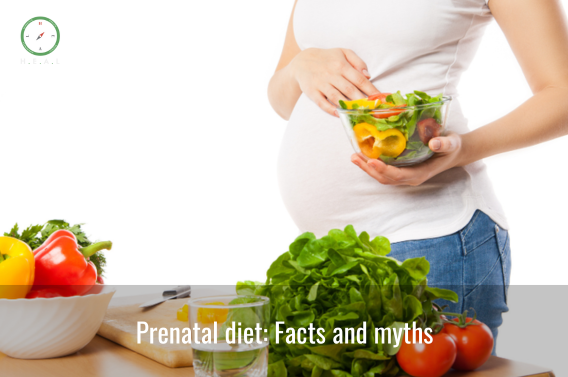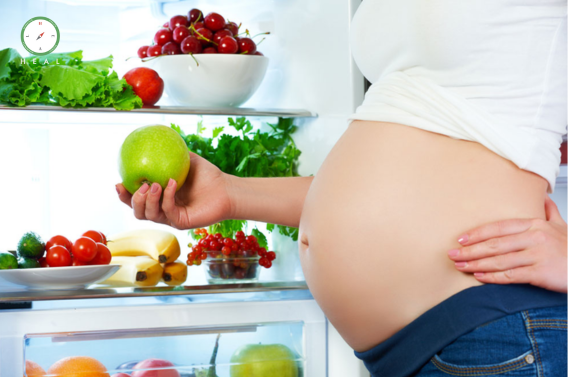A prenatal diet plan is a specialized eating strategy designed to meet the unique nutritional requirements of pregnant women, ensuring the health and development of both the mother and the growing baby. It emphasizes the consumption of nutrient-rich foods rich in vitamins, minerals, and essential nutrients. These include a diverse array of fruits and vegetables, whole grains, lean proteins, and dairy or dairy alternatives. Particular attention is given to essential nutrients such as folate, iron, calcium, and protein, which are crucial for the baby's growth and development.

A prenatal diet plan is important because it plays a crucial role in supporting the health and development of both the mother and the developing baby during pregnancy. Here are some key reasons why:
Nutrient Supply: A well-balanced prenatal diet provides essential nutrients such as folic acid, iron, calcium, and vitamins that are vital for the growth and development of the baby's organs, bones, and overall health.
Preventing Birth Defects: Adequate intake of nutrients like folic acid early in pregnancy can help prevent neural tube defects in the baby's spinal cord and brain.
Healthy Weight Gain: A prenatal diet plan helps manage healthy weight gain during pregnancy, which is important for the baby's growth and the mother's overall well-being.

Energy and Vitality: Pregnancy can be physically demanding, and a proper diet provides the energy needed to cope with pregnancy-related fatigue and discomfort.
Reducing Complications: A balanced diet can help reduce the risk of complications like gestational diabetes and preeclampsia.
Postpartum Recovery: A well-nourished mother is better prepared for postpartum recovery and breastfeeding.
Emotional Well-being: Proper nutrition can help stabilize mood swings and reduce the risk of prenatal depression.
A prenatal diet plan should focus on providing the necessary nutrients to support the health and development of both the mother and the growing baby. Here's a general guideline for a balanced prenatal diet:
Folate and Folic Acid: These are crucial for preventing neural tube defects. Sources include leafy greens, fortified cereals, and legumes.
Iron: Helps prevent anaemia and supports increased blood volume. Broccoli, sweet potatoes, fruits, beans, and fortified cereals are good sources of iron.
Calcium: Important for the development of the baby's bones and teeth. Include dairy products, fortified plant-based milk, and leafy greens.
Protein: Necessary for the growth of the baby's organs and tissues. Chickpeas, various beans, legumes, and nuts are protein-rich food options.

Omega-3 Fatty Acids: Support brain and eye development in the baby. Spinach, cauliflower, rajma (kidney beans), flaxseeds, soybeans and walnuts are good sources of omega-3 fatty acids.
Vitamin D: Works with calcium to help develop the baby's bones. Sun exposure, fortified foods, and supplements can provide vitamin D.
Fiber: Helps with digestive issues common during pregnancy. Whole grains, fruits, and vegetables are rich in fibre.
Hydration: Drink plenty of water to stay well-hydrated, as dehydration can lead to complications.
Limit Caffeine and Avoid Alcohol: High caffeine intake and alcohol should be limited or avoided during pregnancy.
Small, Frequent Meals: Eating smaller, more frequent meals can help manage nausea and maintain steady energy levels.

Should Eat for Two:
The notion that a pregnant woman should "eat for two" is a common misconception. While it's true that a mother's nutritional needs change during pregnancy to support the growing baby, it doesn't mean she should double her food intake. Quality of nutrition is far more important than quantity.
During the first trimester, there's generally no need for extra calories, and in the second and third trimesters, an additional 300-500 calories per day may be recommended, but this can vary based on individual circumstances. The focus should be on nutrient-dense foods that provide essential vitamins, minerals, and protein to support the health and development of both the mother and the baby. Eating balanced meals that include a variety of fruits, vegetables, lean proteins, whole grains, and dairy or dairy alternatives is key to a healthy pregnancy. It's essential to listen to one's body, consult with healthcare providers, and follow personalized dietary recommendations to ensure a safe and healthy pregnancy journey.
Avoid All Dairy Products:
It's a myth that dairy products are harmful to pregnant women. Avoiding all dairy products during pregnancy is not necessary and can potentially lead to nutrient deficiencies. Dairy products are excellent sources of calcium, vitamin D, protein, and other essential nutrients that support both the mother's and the baby's health during pregnancy. Calcium, in particular, is crucial for the development of the baby's bones and teeth. In such cases of lactose intolerance, there are lactose-free and dairy-free alternatives available, like fortified plant-based milk (soy, almond, oat, etc.), that can provide the necessary nutrients.
Every pregnancy is unique, so it's essential to work with a healthcare provider or registered dietitian to create a personalized prenatal diet plan based on your specific needs, medical history, and any pregnancy complications.
Vidhi Beri, a renowned health transformation coach, Global Educator and Specialist in the field of Holistic Health from Kolkata is working in this field successfully. As a health transformation coach, she involves guiding and supporting individuals in making positive changes to improve their overall health and well-being. She aims to help clients achieve their health goals and create sustainable lifestyle changes. To know her work better, please visit the official website https://www.vidhiberi.com/